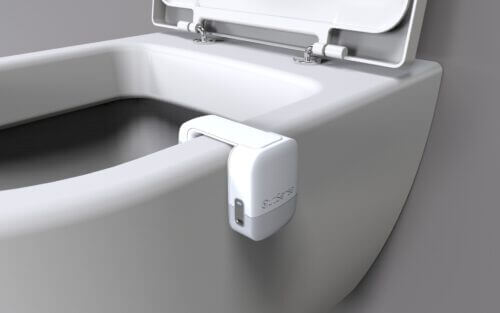Yifat Shalom, CEO of OutSense: "A significant part of the 700 deaths a year from colon cancer can be prevented through early digital detection of blood in the stool"

The start-up company OutSense Maor Yehuda, which specializes in digital health, completed a fundraising round A in the amount of 2.2 million dollars from the venture capital fund Peregrine. Together with the Innovation Authority grants, the company's total fundraising since its inception reached $3.5 million.
OutSense was founded in 2016 and operated for three years in the Incentiv incubator owned by the Peregrine Foundation. Now, with the completion of the technological development and its exit from the incubator, the company has completed the capital raising, and is preparing for serial production of the solution it developed and marketed worldwide. The technology has been proven in experiments in Israel and presented a 90% accuracy level in detecting hidden blood in feces, and in the coming months large-scale experiments will begin in Israel and abroad, including in Japan.
OutSense has developed a unique optical hardware component installed in the toilet that has been approved as a patent. The solution includes multispectral optical sensors, a lighting module and an autonomous controller. The device scans the contents of the toilet and detects the optical signature of substances in feces and urine, sends the data to AI-based processing in the cloud and provides indications for various diseases and physiological conditions, including hidden blood in feces as a screening test for colon cancer, urinary tract infections, early detection of constipation and diarrhea, dehydration, and more . In this way, OutSense promotes a revolution in the world of urine and feces testing and actually moves the biochemical laboratory to the cloud.
OutSense's solution is a replacement for the manual collection of secretions and their delivery to laboratories. Many are reluctant to perform these tests and various diseases are sometimes discovered very late, which leads to expensive hospitalizations and the deterioration of the diseases.
OutSense's technology regularly monitors the patient's secretions and provides automatic alerts to medical teams in medical institutions and in the community, which enables home treatment and prevents unnecessary arrival of subjects to the various clinics, while saving time, costs and exposure to infections. The tests are carried out in a completely discreet manner and the data allow continuous monitoring of the patient's health condition and the provision of personalized treatment with a high level of accuracy.
One of the main target markets for OutSense's solution is the digital health market for adults whose financial volume is estimated at 30 billion dollars a year. A high percentage of adults deteriorate into a state of dehydration due to taking medication, loss of thirst and dementia. When these symptoms are not recognized in time, they often lead to high-cost hospitalizations. Elderly women suffer from urinary tract infections and the late detection also involves complications of the infection and difficulty in curing it. The continuous monitoring using OutSense enables early detection of the diseases and faster and cheaper treatment that prevents complications among this population.
Yifat Shalom, CEO of OutSense: "Every year over 700 people worldwide die from colon cancer due to late detection and many of them could have been saved using OutSense's technology. Our goal is to enable early detection of diseases, prevent their outbreak or worsening, improve the quality of life and reduce medical costs. Our long-term goal is to build the largest database in the world in the field of human secretions that will enable the production of insights and recommendations in many other areas, including: early identification of epidemics and global trends, optimization of food supplements, personalization of diets and weight control, tolerance of medications and dosages, and more."
More of the topic in Hayadan:
